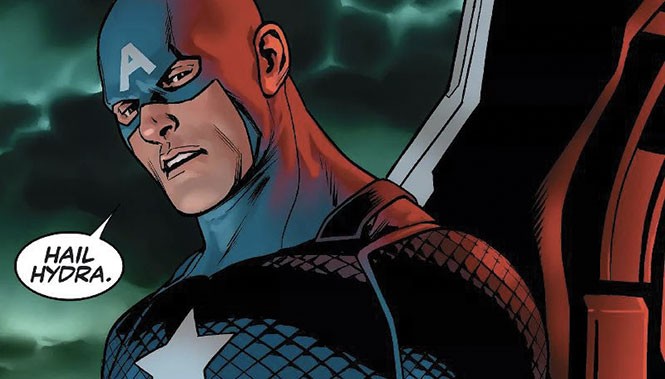
The recently released Captain America-Steve Rogers #1 comic book brings the original "First Avenger" back into the fold of the Marvel universe. Written by Nick Spencer and drawn by Jesus Diaz, the book is action-packed, gorgeous to look at and easy to understand. In some ways, it's the perfect jumping on point for a new reader.
But the book might not be attracting a whole lot of new readers, which is a shame, because it's a great read. The problem is probably that people were spoiled on the book by the press without any context. Hell, if you're reading this, you're probably one of the people who got spoiled. Everyone got spoiled. And if you hadn't, here it is again. Spoiler alert: The last page of the comic book has Captain America proclaiming his allegiance to Hydra, the evil organization that was even too evil for the Nazis.
Now, the book is much more than just that one page. I mean, how would you feel about watching The Empire Strikes Back if the only thing you'd seen was Darth Vader's proclamation that he was Luke's father? Would Citizen Kane have the impact it did and make you want to watch it from the beginning if you had been inundated with images and memes with the sled being tossed in the incinerator? Of course not, because those moments are the result of build-up through the course of the story, and are virtually meaningless without all the context that brings you on the journey to that final place. It's unfair to judge the destination of a serialized piece of art without also judging the journey.
The journey for this comic book is a fascinating one, split between two timelines. In the present, we're shown Steve Rogers saving the world against a new Hydra threat, led by the Red Skull. They're wrapped in the symbology of Ayn Rand, and the things coming out of Red Skull's mouth might very well be lifted directly from a Donald Trump speech. In the other timeline, we're taken to 1926 to see a young Steve Rogers living with his mother. She's a victim of spousal abuse, and the one organization that seems able and willing to help get her out of her plight is a community activist organization named—you guessed it—Hydra. Although it's not stated specifically, there are hints that this is all a Hydra plot to undermine the world while Steve Rogers is at his most impressionable.
In one issue, the book says so much about the bad ideas that can corrupt otherwise good-hearted people; it acts as a black mirror set against our current political situation. At their best, the comics starring Captain America have always offered a reflection of our political situation, whether it was his assassination during the Bush administration, or all the way back to punching Hitler on the cover of his very first issue. What's it like to realize that your country has always been deeply racist and run by super-villains of an elite class? What's it like to find that, through the same brain-washing tricks that allow children to believe in Santa Claus (or become Republicans), Captain America, at least in this timeline, might be the bad guy? It's the reality check we need in such a desperate time.
It's fine to be upset by a comic book and the twist we see here, but I think the journey the book takes readers on is worth the shock of the ending. It's not a publicity stunt meant to sell more comics as much as some great storytelling—which is also meant to sell more comics.
Don't be swayed by the online outrage you see over the book. Read it for yourself and see where that journey takes you. There's more depth to it than the one page you've seen. In reading it, you might learn something about our America.
Though the first printing sold out, the book is being reprinted, and you will be able to find copies at your local comic-book stores. You can also snag it digitally at Marvel.com.